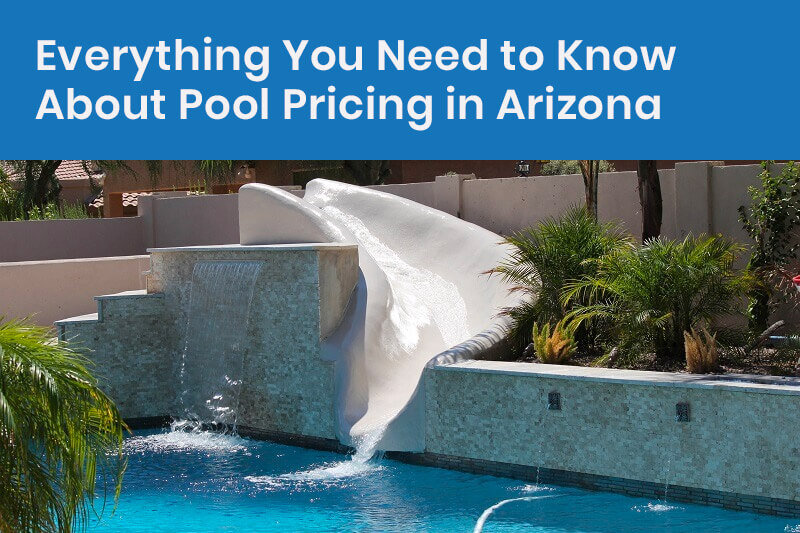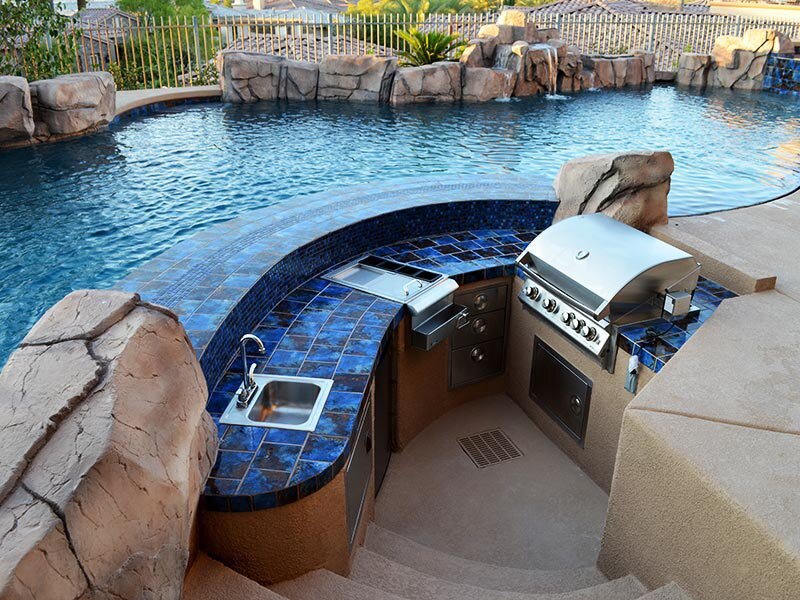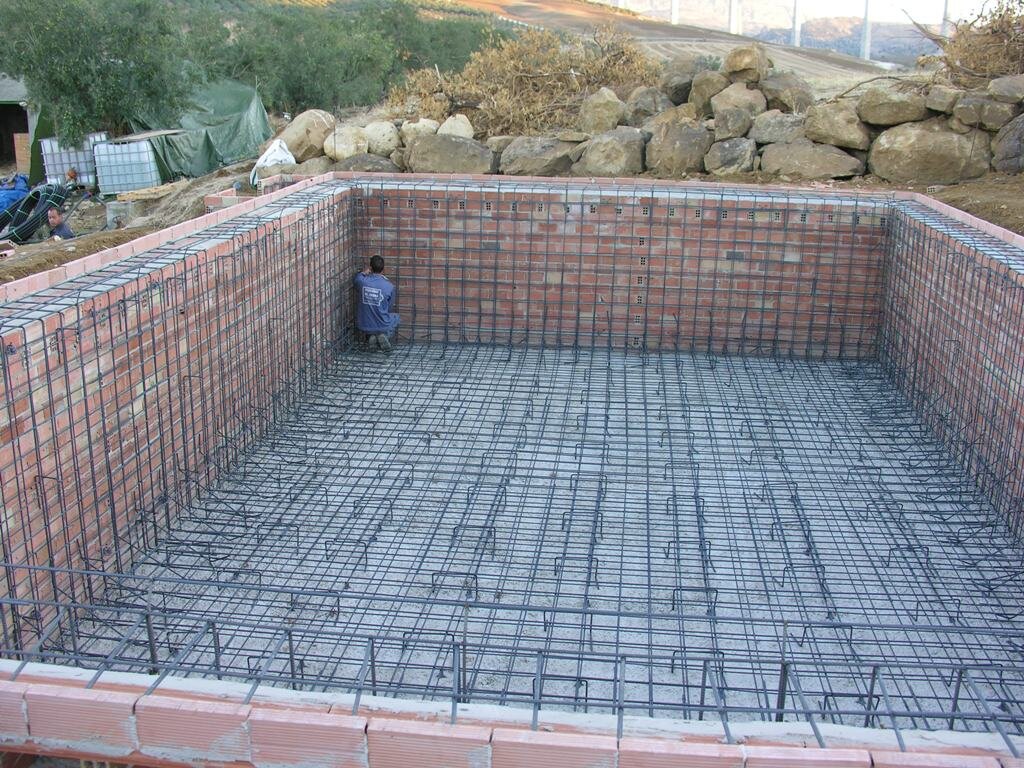The addition of a swimming pool to an Arizona home is not simply a luxury, but often considered a necessity given the state’s warm climate. However, this substantial investment requires thoughtful planning and consideration due to its potential impact on the homeowner’s budget. The purpose of this comprehensive examination is to provide readers with an accurate understanding of the variables influencing the overall cost of installing a pool in Arizona. From identifying different types of pools, exploring various materials and designs, delving into additional features, considering maintenance and upkeep costs to understanding permitting processes and installation procedures – each element contributes significantly towards shaping the final expenditure.
Enlightening oneself about these factors does not only enable informed decision-making but also enhances one’s competence in managing resources effectively while adhering to their envisioned design preferences. This article serves as a guide for those embarking on their journey towards adding this valuable feature to their property. It aims at providing detailed insights into how each aspect contributes towards shaping your investment, thus paving way for financial preparedness and successful project execution. By comprehending these elements, homeowners can ensure they achieve their desired result – be it a simple plunge pool or an extravagant resort-style oasis – without compromising on quality or exceeding their budget constraints.
Factors Affecting Cost
Several factors can influence the average cost of a pool in Arizona, including the pool’s size, materials used, design complexity, and any additional features like heating or lighting. For instance, larger pools require more materials and labor for construction, so they tend to be more expensive than smaller ones. Material selection also plays a crucial role in determining the pool installation costs; high-quality materials such as concrete and fiberglass are typically pricier but last longer and require less maintenance over time compared to cheaper options. Additionally, intricate designs often necessitate skilled workmanship which may further inflate the overall expenses. Lastly, integrating extra features like temperature control systems or underwater lights enhances not only the functionality but also adds up to the costs.
As part of a broader view on property investment in Arizona, installing a swimming pool significantly contributes to boosting property value. It is particularly noteworthy that adding an aesthetically pleasing and functional amenity such as a pool is likely to attract potential buyers if one decides to venture into selling their property within the robust real estate market in Arizona. Indeed, this home improvement yields substantial returns on investment (ROI), making it an appealing option for homeowners looking forward to enhancing their living space while simultaneously increasing their assets’ market value.
While understanding these factors that affect pool installation costs provides valuable insights into budgeting for such an endeavor in Arizona’s thriving real estate environment, it is equally important to consider different types of pools available in the market when planning for this significant addition to your home. Each type offers unique benefits and comes with its own set of associated costs which greatly impact its total price tag – an aspect that will be discussed further in our exploration on ‘types of pools’.
Types of Pools
Differentiating between various types of swimming pools is crucial, as each type offers unique features and pricing models. In the context of Arizona housing trends, incorporating a pool can significantly increase home resale value by adding outdoor amenities that are attractive to potential home buyers. Yet, it’s important to recognize that not all pools are created equal; their cost, maintenance requirements, and aesthetic appeal vary greatly depending on their type.
| Type of Pool | Average Cost in Arizona | Key Features |
|---|---|---|
| In-ground Concrete Pool | $30,000 – $50,000 | Customizable shape and depth, durable |
| Fiberglass Pool | $20,000 – $35,000 | Low maintenance needs, non-abrasive surface |
| Above-ground Pool | $1,500 – $4,500 | Lower installation costs |

In-ground concrete pools offer great flexibility in design but come with higher costs both in terms of installation and upkeep. However they typically add more value to your home than other types. Fiberglass pools are popular for being low-maintenance while still providing an appealing aesthetic which can help when attracting home buyers. Despite having the lowest cost among these options due to lower labor expenses during installation process above-ground pools generally do not contribute much towards increasing a property’s market value.
Choosing the right type of pool is only part of the equation: materials used in construction also play a pivotal role in determining both upfront costs and long-term maintenance expenses. The nature of this relationship will be further explored within the next section concerning ‘materials and design’. This will provide insight into how these elements impact not just initial investment but also ongoing pool ownership costs.
Materials and Design
In the realm of swimming pool construction, the choice of materials and design directly impacts both the aesthetic appeal and longevity of your investment. The selection process is paramount to ensuring a good return on investment, especially in Arizona where home improvements like swimming pools can significantly increase property value. As such, understanding the different materials available for pool construction and their respective benefits is an important part of quick home sale strategies.
- Concrete: This material allows for total customization in terms of shape and size. However, it requires more maintenance than other options due to its porous nature which can promote algae growth.
- Fiberglass: These are factory-molded into giant bowl-shaped pieces which are then set into the excavated hole by a crane. They offer smooth surfaces that discourage algae growth but have limitations regarding shape and size.
- Vinyl: Vinyl liner pools provide a non-abrasive surface and are less expensive upfront compared to other types but require replacement every 7-10 years.
The design aspect should not be overlooked as it greatly contributes to the overall appeal of the pool area, thereby playing a crucial role in home selling tips. From traditional rectangular designs to freeform shapes that mimic natural bodies of water or exotic infinity pools that create an illusion of endlessness – these elements play significant roles in enhancing property aesthetics. Moreover, incorporating features like tanning ledges, integrated landscaping or unique lighting systems can further augment your pool’s allure while also increasing its functionality.
Looking beyond just materials and design, there are numerous additional features that could elevate your pool from being merely functional to truly exceptional. These additions not only heighten enjoyment for homeowners but also have potential to significantly enhance property values – a strategic consideration for anyone eyeing swift real estate transactions in Arizona’s competitive market landscape.
Additional Features
Beyond the basic structure and design, incorporating innovative features into your swimming pool can dramatically enhance its appeal and functionality, thus providing a significant edge in the competitive real estate market. In Arizona’s hot climate, these additional elements offer not just aesthetic value but also practical benefits that can greatly improve a homeowner’s outdoor experience. Options range from energy-efficient heating systems to automated cleaning tools, integrated waterfalls or fountains for visual effect, and special lighting for nighttime use.

The cost of these add-ons varies widely based on their complexity and the materials used. For instance, installing an advanced filtration system may cost around $1,500 to $2,500 depending on the size of the pool. Similarly, adding a custom-built waterfall or fountain could set homeowners back anywhere from $1,000 to over $15,000. Lighting options are another factor to consider; simple LED lights might only cost a few hundred dollars while high-end fiber optic lighting could reach up to $5,000. It is essential for potential pool owners in Arizona to carefully evaluate their budget against desired features when planning their investment.
Elevating a swimming pool with additional features enhances its usability and attractiveness – factors that may contribute positively towards property value appreciation over time. However, it is necessary to remember that these enhancements often come with increased maintenance requirements which should be factored into long-term ownership costs. This will be further explored in the subsequent discussion surrounding pool upkeep and ongoing expenses in Arizona.
Maintenance and Upkeep
Maintaining the pristine condition of a swimming oasis requires regular upkeep and can carry significant ongoing expenses, particularly when considering the hot, arid climate typical to certain regions. In Arizona, pools require frequent cleaning due to dust storms and high winds that often deposit debris. Furthermore, the intense sun can cause rapid evaporation leading to an increased need for water replacement and chemical rebalancing. Therefore, pool owners in this region should anticipate these factors when budgeting for maintenance costs.
A key component of pool maintenance is ensuring the cleanliness and balance of pool water which includes testing, adding chemicals as needed, cleaning filters, vacuuming and skimming. The price range for such services varies depending on the size of the pool and specific needs but can average between $80-$200 per month in Arizona. Additionally, equipment servicing or replacements such as pumps or heaters may be required over time which can add to overall annual expenses. Unexpected repairs from wear-and-tear or weather-related damages are also a potential cost factor.
Beyond routine tasks like cleaning and balancing water chemistry, long-term preservation efforts such as resurfacing might also be necessary especially under extreme weather conditions experienced in Arizona’s desert environment where UV rays can degrade surface materials over time. This could mean an additional expenditure running into thousands depending on the type of pool material used. It is important to consider these elements in total cost calculations not only to ensure longevity of your aquatic asset but also for optimal enjoyment through its lifespan. With this understanding about maintenance considerations for owning a swimming facility in Arizona’s unique climatic conditions comes recognition of other influencing factors such as permitting requirements and installation procedures that influence overall project cost beyond initial construction investment.
Permitting and Installation Process
Construction of a swimming facility necessitates adherence to specific permitting processes and installation procedures, which significantly contribute to the overall project expenditure. In Arizona, acquiring the necessary permits from local authorities is an integral part of the pool construction process. This ensures that all safety standards and zoning regulations are met before breaking ground on any new project. The cost of these permits varies between municipalities but averages around $500 – $1,000. Moreover, site preparation including excavation and disposal of soil also adds up in the total cost.

The installation procedure involves several steps each with its own associated costs. First off, there’s the actual construction cost which largely depends on the size, design complexity, and materials used for building the pool. Use of high-quality materials such as concrete or fiberglass can increase these costs significantly. Additionally, factors such as incorporating a heating system or adding special features like waterfalls or spas can push up expenses further.
Furthermore, professional services related to plumbing and electrical installations cannot be overlooked when calculating total investment in a pool project in Arizona. These requirements not only ensure proper functionality but also conform to safety codes and regulations. All these aspects underline how permitting process and installation procedures play a critical role in determining average cost of constructing a swimming pool in Arizona – it’s not just about pouring water into an excavated hole! Looking beyond initial outlay provides a more comprehensive understanding of potential returns on this significant financial commitment.
Return on Investment
In assessing the financial implications of a swimming pool, it is crucial to consider the potential return on investment that such an undertaking can yield. In Arizona, this return on investment (ROI) can be significantly influenced by factors such as the property’s location, its current value, and the quality of the pool installation. Generally speaking, a well-installed and maintained swimming facility could potentially increase a property’s overall value by up to 7%. This percentage may not seem substantial at first glance; however, when applied to properties valued at several hundred thousand dollars or more, this represents a significant increase in asset worth.
The ROI for pools is also greatly affected by regional factors. In Arizona specifically, due to its hot climate and high demand for aquatic recreational facilities during summer months, homes with swimming pools often attract more interested buyers compared to those without. Moreover, new developments in energy-efficient pool technology have also made owning and maintaining pools less costly over time. These advancements may contribute positively towards long-term ROI calculations by reducing ongoing operational expenses.
Taking all these considerations into account provides a clearer picture of the potential financial benefits associated with installing a swimming pool in Arizona. It shows that while there are upfront costs involved in constructing these facilities – including equipment purchases, labor costs and permitting fees – they can still represent wise investments given their ability to enhance property values and appeal while simultaneously offering owners opportunities for enjoyment and relaxation during sweltering summer months. Thus understanding this potential for tangible returns is vital when deliberating on investing in such amenities.
Frequently Asked Questions
How do weather conditions in Arizona impact the durability of the pool?
Arizona’s arid climate can affect pool durability due to excessive sunlight and high temperatures, potentially causing premature wear in pool materials. Regular maintenance is crucial for prolonging the lifespan of pools in this region.
What are some eco-friendly options for pool installation in Arizona?
Eco-friendly options for pool installation in Arizona include solar-powered heaters, energy-efficient pumps, and saltwater systems. Additionally, utilizing natural vegetation as shade can reduce evaporation and keep the pool cooler naturally.
How does the cost of a pool in Arizona compare to other southwestern states?
The cost of pool installation in Arizona, when compared to other Southwestern states, varies significantly due to factors such as labor costs, material prices, and the complexity of the design chosen.
What types of insurance are recommended for pool owners in Arizona?
For Arizona pool owners, liability insurance is highly recommended to cover potential accidents. Additionally, consideration should be given to property insurance that specifically includes coverage for pool-related damages or issues.
Are there any local pool contractors in Arizona known for their excellent service and affordable rates?
Several renowned pool contractors in Arizona, such as Presidential Pools and Spas or Shasta Pools & Spas, are lauded for their exceptional service and competitive pricing. Due diligence is recommended when selecting a contractor.

